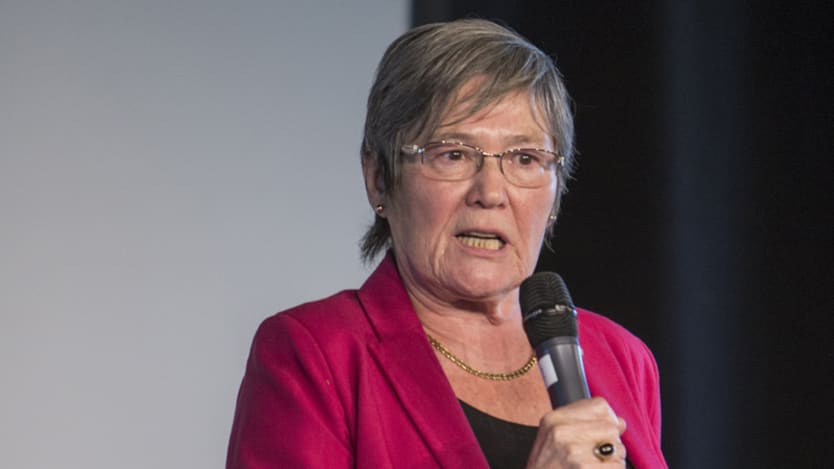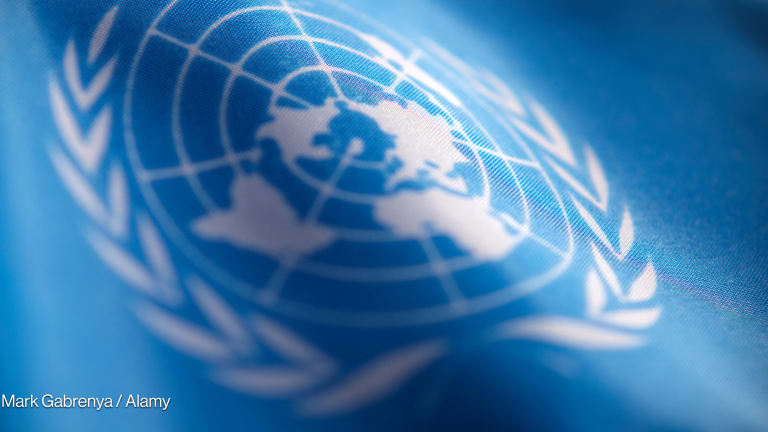
LONDON — Sexual abuse of aid recipients “wasn't an issue in any way, shape or form in my time in office,” the United Kingdom’s former development chief Clare Short told the International Development Committee in the House of Commons on Tuesday.
Short, who served as the U.K.’s first secretary of state for international development from 1997-2003, made the claim despite a leaked 2002 United Nations report which implicates aid workers from 15 international development organizations — several of them U.K.-funded — as well as U.N. peacekeepers who allegedly exploited aid recipients to gain sexual acts in return for humanitarian supplies in Liberia, Sierra Leone, and Guinea. Many of the reported victims were children. The 84-page document, produced by the U.N. High Commissioner for Refugees and Save the Children UK, and leaked to The Times newspaper last week, also identified 25 local and regional organizations whose employees engaged in sexually exploitative relationships with refugee children.
Short and another former secretary of state for international development, Andrew Mitchell, who served in the role from 2005-2010, appeared before IDC to offer evidence about their knowledge of cases of sexual exploitation involving aid workers funded by the Department for International Development.
“We’re talking here as if the department that funds had to scrutinize the management and quality of management … I was responsible for the funding, but I didn’t know much about the internal management of those organizations ...”
— Clare Short, former U.K. secretary of state for international developmentSpeaking about the U.N. report, Short said: “I don’t remember it. I was very close to the U.N. peacekeeping operations in Sierra Leone because it was collapsing, and we were trying to prop things up and get reform. So if there were things, I would have heard of them, because I was very engaged.”
Presented with a note from DFID which claimed that “formal advice was provided to ministers on the 2002 report at the time of publication,” Short responded: “I was a very, very hands-on, minister — I read everything that moved, and I have no recollection of this.”
At the time, Short said, the department implemented many of its own programs directly, rather than through NGOs — it wasn’t until later that she spearheaded efforts to “create conditionalities” to align NGOs’ objectives with the policies of the department. As a result, NGOs at that time received much less funding from DFID.
“I wasn't responsible for those organizations; DFID wasn't running them,” she said. “We’re talking here as if the department that funds had to scrutinize the management and quality of management. I never had that sense. I was responsible for the funding, but I didn’t know much about the internal management of those organizations, which I think is normal.”
Asked if the report might have been covered up, Short said she did not believe there was “a culture of cover-up,” within DFID. “I think the department was very open with me about all sorts of difficult questions.”
At the same time, she said a potential cover-up would not necessarily be surprising, given the national and international climate at the time. Domestically, the U.K. was struggling to face up to issues of child sexual exploitation, and Short said it wouldn’t “surprise her” if that taboo extended to overseas aid.
“Britain didn’t confess to itself in public life that there was a big issue of child sex abuse. It is remarkable how recent all of it has been. So I assume that was part of it, that the cover-up of child sex abuse was shockingly widespread,” she said.
UN peacekeepers
The leaked report alleges that U.N. peacekeepers from nine countries “sexually exploited children in exchange for money and food” in 2001.
“Peacekeepers are alleged to pool money to obtain a girl and then all have sex with the same child,” said the report, a copy of which Devex has seen. “Children and adults spoke of teenage girls being asked to strip naked, bath and pose in certain positions while the peacekeepers take pictures, watch and laugh. Some are alleged to have sex with the girls,” sometimes without condoms.
Mitchell said he was not specifically aware of the 2002 U.N. report, nor of a related report in 2008, but was “aware of them in general terms.”
“I was aware of these issues, and as a former U.N. peacekeeping soldier myself in Cyprus, I was horrified by reports of peacekeepers in [the Central African Republic, where allegations emerged in 2015], but in other locations as well, where the degree of sexual exploitation and abuse was clear. And I certainly raised it on at least one occasion to Ban Ki Moon [former secretary-general of the U.N.] when I was in New York, because I felt very strongly about it.”
At the same time, Mitchell said he did not raise his concerns with U.K. aid-funded organizations. “I can’t recall any occasion where I raised these issues directly with NGOs, but I do recall raising it with the secretary-general of the U.N., for the reasons I set out earlier,” he said.
Asked how they believed the U.K. could play a greater role in influencing the conduct of U.N. peacekeepers, both former DFID chiefs said the country could use its influence to push for change at the highest levels, while using its logistical and military expertise to better train peacekeepers.
“The thing I will say about U.N. peacekeepers is they abuse — notoriously, sexually,” Short said. “The U.K., like others, votes for peacekeepers and then lets some of the poorest countries in the world, with some of the least well-trained soldiers, staff those forces. I think it would be good for the U.K. to put more forces in with logistics and [to] organize. Maybe we could improve things that way.”
Mitchell added: “Britain doesn’t by and large provide soldiers, but what it does do is a lot of logistics support. The role of [the ministry of defense] is not so much the codes for its own soldiers; it’s giving advice and help to other forces which may benefit from the experiences the MOD has.”
Finally, Mitchell said that as one of the U.N.’s biggest donors, the U.K. should encourage its permanent representative at the U.N., Karen Pierce, to communicate peacekeeper reform as a “top priority for Britain.”
Accountability
Accountability in the aid sector: Humanitarians can no longer be above the law
Campaigners are calling for changes in the way the humanitarian sector is policed after the recent Oxfam scandal shed light on legal loopholes which have allowed sexual abuse and exploitation committed by United Nations and NGO staff to go largely unreported and unpunished for decades.
Earlier on Tuesday morning, the committee heard from Paula Donovan, co-director of AIDS-Free World, a United States-based NGO running a campaign to crack down on abuses by U.N. peacekeepers and nonmilitary staff. Donovan told committee members that, due to the U.N.’s unique status of immunity, the U.K., along with other member states, needed to provide a “system of checks and balances” for the organization, which is unable to neutrally police itself.
“Only the U.K. and other member states are allowed to insist that the U.N. open its books,” Donovan said. She called on the U.K. to ensure investigations into allegations of sexual exploitation and abuse, and other crimes, are done in a neutral, fair, and effective way.
Natalie Samarasinghe, executive director of UNA-UK, a U.K. charity devoted to building support for an effective U.N., agreed, saying there is a “huge gap still on accountability” when it comes to the U.N. and that member states need to show political leadership on the issue.
However, she warned that member states are “part of the solution, but also part of the problem,” since senior U.N. positions are “politicized” and many countries have opposed attempts to reform the system, such as the U.N. Security Council Resolution 2272 on sexual exploitation and abuse, introduced in 2016. The reform gave the U.N. powers to repatriate peacekeeping troops that are under investigation for allegations of abuse, and called for troop-contributing countries to do more to train, punish, and prevent abuse.
“There was huge resistance to reforms … [around] holding troop-providing countries to account,” she said, adding that “the U.K. and others need to play a role in solving [these issues] … since not all member states are approaching this in the best way possible.”
Tuesday’s evidence session forms part of an ongoing IDC inquiry into sexual exploitation in the aid sector. The leaked report is the latest in a series of sexual misconduct and abuse scandals that have emerged in the U.K. media since February, with current DFID chief Penny Mordaunt vowing the U.K. will take the lead on finding safeguarding solutions for the aid sector, including calling a safeguarding summit and establishing a new safeguarding unit.
Last year, the governing Conservative party announced it would make some U.N. funding contingent on the organization “strengthening its child protection policies.”
Additional reporting by Sophie Edwards.








